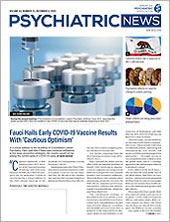Suicide deaths among adolescents and young adults increased after the U.S. Food and Drug Administration (FDA) issued warnings about antidepressant use and possible suicidal ideation in these populations, a study in Psychiatric Research and Clinical Practice has found. The researchers buttressed their findings by including results from more than a decade of prior research suggesting that the warnings also reduced care seeking, depression diagnoses, psychotherapy visits, antidepressant treatment, and monitoring of patients who take antidepressants and may have led to increased suicide attempts.
“It is surprising that a warning could set off a chain of events that are important intermediate outcomes in health care that could influence suicide,” senior author Stephen B. Soumerai, Sc.D., a professor of population medicine at Harvard Medical School and Harvard Pilgrim Health Care Institute, told Psychiatric News. “The warnings had unintended consequences of fear and stigma, not just among youth but among parents and clinicians.”
Soumerai and colleagues analyzed data on suicide deaths by people aged 10 to 24 years from the Centers for Disease Control and Prevention’s WONDER database, which contains mortality counts for U.S. residents based on birth certificates. They analyzed suicide rates for the following three time segments:
•
1990 to 2002, a 13-year span before the FDA issued its first warning, a public health advisory that children and adolescents who took antidepressants were at increased risk of suicidal ideation and behavior
•
2003 and 2004 as a transition period after the initial advisory
•
2005 to 2017, after the FDA required a boxed warning, effective in January 2005, for children and adolescents taking antidepressants, a warning that was expanded to include young adults in 2007
Before the warnings, suicide deaths in youth had been on a downward trend. From 1990 to 2002, suicide deaths among adolescents aged 10 to 19 years dropped from 6.4 to 4.2 per 100,000 per year. For the same time frame, suicide deaths had decreased in young adults aged 20 to 24 years from 15.1 to 12.3 per 100,000 per year.
However, almost immediately after the FDA issued its first black-box warning on antidepressants, depression care began to decline and suicide deaths began to climb in both groups. Between 2005 and 2017, suicide deaths among adolescents rose from 4.4 to 7.2 per 100,000 people a year. At the same time, suicide deaths among young adults rose from 12.4 to 17.0 per 100,000 people a year.
“A mechanism for this association is clear: The FDA antidepressant ‘warning,’ accompanied by exaggerated media coverage, stigmatized depression care for young people and fostered reluctance by providers to initiate antidepressant treatment. Thus, the warnings reduced diagnosis of major depression and drug and nondrug mental health treatment,” the researchers wrote.
“Not all young people with depression should be treated with medication. Research demonstrates that many will do well with structured forms of therapy such as CBT [cognitive-behavioral therapy],” said David Fassler, M.D., a clinical professor of psychiatry at the University of Vermont’s Larner College of Medicine, who was not involved in the research. “The real tragedy is that following the black-box warnings and the related media coverage, so many adolescents and young adults received no treatment at all.
“This [study] represents a significant contribution to the ongoing dialogue concerning the impact of the FDA’s black-box warnings,” Fassler added. “Hopefully, it will help inform clinical practice, public policy, and future research initiatives.”
Soumerai believes that the FDA should consider downgrading its warnings on antidepressants.
“At the very least, take them out of the box,” he said. “We’re not saying these drugs don’t have the potential to harm. All drugs have the potential to harm if they are used inappropriately. Antibiotics have significant risks. Nonsteroidal anti-inflammatory medications can put people with certain risk factors into kidney dialysis. But undertreatment of depression can be harmful [and] result in suicidal behaviors and death.”
Several of the researchers were supported in part by a cooperative agreement with the National Institute of Mental Health. ■
“Increases in Suicide Deaths Among Adolescents and Young Adults Following U.S. Food and Drug Administration Boxed Warnings and Declines in Depression Care” is posted
here.

